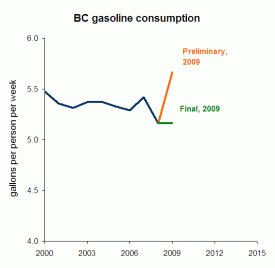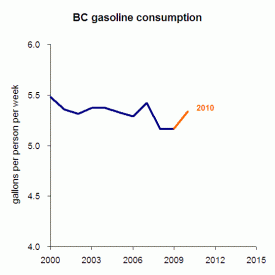Hoo boy. Last year, we reported that per capita gasoline consumption in British Columbia spiked unexpectedly in 2009, notching a 9 percent per capita gain. The numbers struck us as odd, but not inconceivable—especially given the steep drop in fuel prices in 2009, coupled with the fact that the province was gearing up for the 2010 winter Olympics. So we checked with the provincial agency that gave us the numbers; and when they assured us that they were confident in the figures they gave us, we went with them.

But now, the official numbers from StatCan, Canada’s main statistical agency, tell a very different story. Per person consumption didn’t spike after all, according to StatCan. Instead, it basically held steady. And the provincial agency that gave us the original numbers has confirmed that the numbers they gave us last year were wrong; they double counted some fuel sales. Drat.
So now that we know that the numbers we reported were wrong, we wanted to say: we’re sorry. We do our level best to catch errors, but this one sneaked through. Unfortunately, our report caused a bit of a hubbub in BC, especially among a few folks who were trying to claim that the provincial carbon tax wasn’t working—which meant that we inadvertently muddied the debate over what we believe to be the planet’s most effective and well-structured carbon tax shift.
But there’s yet another wrinkle in the story.
Just last week, StatCan released the new official numbers for 2010. They show a significant uptick in gas consumption from 2009 to 2010, almost like a miniaturized echo of the same trend we thought we’d spotted a year earlier.
 Given our experience with the 2009 data, we’re hesitant to say—yet—that the 2010 uptick is real. It’s certainly possible. Yet it’s also clearly out of step with the trends in the Northwest states, where gas consumption has remained roughly flat.
Given our experience with the 2009 data, we’re hesitant to say—yet—that the 2010 uptick is real. It’s certainly possible. Yet it’s also clearly out of step with the trends in the Northwest states, where gas consumption has remained roughly flat.
So for the moment, we’re suspending our judgment about the fuel consumption trends that are being reported by StatCan. We’re also working on the 2011 version of our annual report on gasoline use trends in the Northwest, which will focus on Oregon and Washington. Stay tuned.


Comments are closed.